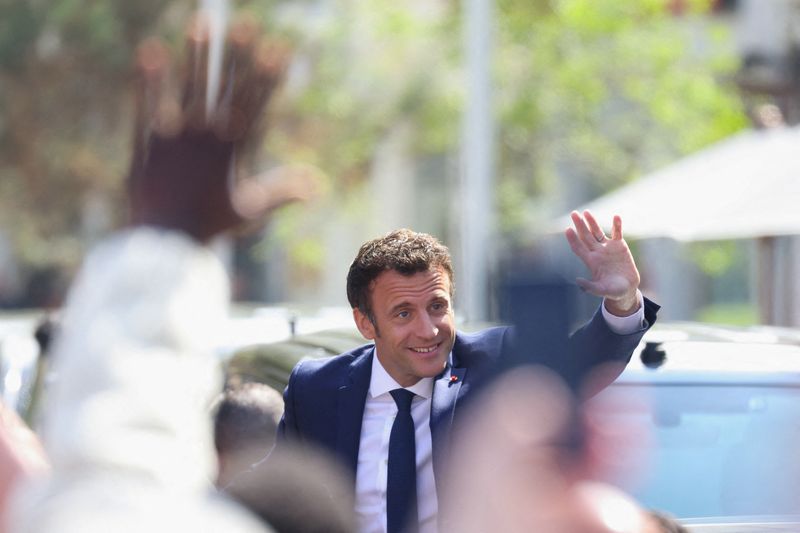By Dhara Ranasinghe, Saikat Chatterjee and Alun John
LONDON/HONG KONG (Reuters) - The euro failed to gain a boost from pro-EU centrist Emmanuel Macron re-election as France's president, and European share futures fell, as investors' fears about global growth outweighed their relief about far-right candidate Marine Le Pen's defeat.
Pan-region Euro Stoxx 50 futures fell 1.75% in Asia trading on Monday morning, alongside falls in U.S. futures and Asian shares. [MKTS/GLOB]
The euro, which initially opened higher, fell 0.34% against the dollar to $1.07725, nearing its two year low hit last week, although it rose to a one month high on the pound.
With 97% of votes counted, Macron was on course for a solid 57.4% of the vote, interior ministry figures showed.
He is the first French head of state in two decades to win a second term, promising continuity in the bloc's second biggest economy at a time of heightened uncertainty unleashed by the war in Ukraine, surging inflation and the prospect of the rapid withdrawal of central bank stimulus.
Going into the election, investors had been concerned about Macron's relatively small poll lead over Le Pen, who favoured nationalising key industries, slashing taxes and cutting French contributions to the EU budget.
However, even though this outcome did not materialise, there were few signs of a relief rally for French and European assets in Asian hours.
"There is a lot for markets to worry about at the moment and that is trumping the effect of Macron's win," said Rob Carnell head of research for Asia Pacific at ING, pointing to U.S. stocks' poor performance on Friday and declines in U.S. futures on Monday, the COVID-19 situation in China and the absence of signs of a resolution to the war in Ukraine.
French stocks closed almost 2% lower on Friday, and the Euro Stoxx 600 closed down 1.8% as rate-hike jitters weighed on global stocks.
"Macron had also extended his poll lead in the days before the election so the outcome was not a huge surprise," Carnell added.
Bond markets were already moving in advance of the election, and the yield premium demanded by investors to hold French 10-year bonds versus European benchmark Germany -- a key barometer of relative risks -- fell to a three-week lows around 42 basis points on Friday as investors anticipated a Macron win.
French 10-year bond yield spread over Germany https://fingfx.thomsonreuters.com/gfx/mkt/lgvdwglyopo/FRANCE2404.PNG
Nonetheless they could be set to move further when they start trading later on Monday.
Kasper Hense, a senior portfolio manager at BlueBay Asset Management, said he expected the French/German yield gap to move 10 bps tighter, noting BlueBay had gone short Italian debt on a view that markets were "a bit complacent" ahead of the election.
"While over the medium term there will be some pressure on peripheral bonds, the immediate market reaction will be one of relief," he said.
French banks such as BNP Paribas (OTC:BNPQY), Societe Generale (OTC:SCGLY) and Crédit Agricole, which rallied after Macron's strong showing during Wednesday's key TV election debate, could also see more gains on Monday.
But in the medium term there are plenty of risks for investors.
"For French stocks, we could see a small relief rally. But after the knee jerk reaction, the focus will turn to the ECB and the rate outlook and that will be a key driver for European stocks and bonds," said Seema Shah, chief strategist at Principle Global Investors.
European Central Bank officials are keen to end bond purchases at the earliest opportunity and raise interest rates as soon as July, sources familiar with ECB thinking told Reuters.
Focus will also shift to France's June parliamentary elections. To implement reforms, the new president will need to secure a parliamentary majority.
That election will have a significant bearing on future policy, so investors with specific French exposure may bide their time before taking a view.

"Is the outcome of this election clear enough to anticipate that the June parliamentary elections will give the President a majority that will allow him to implement his pro-business and pro-European policies desired by the markets?" said Frederic Leroux, a member of Carmignac's investment team.
"It seems dangerous at this stage to take it for granted."